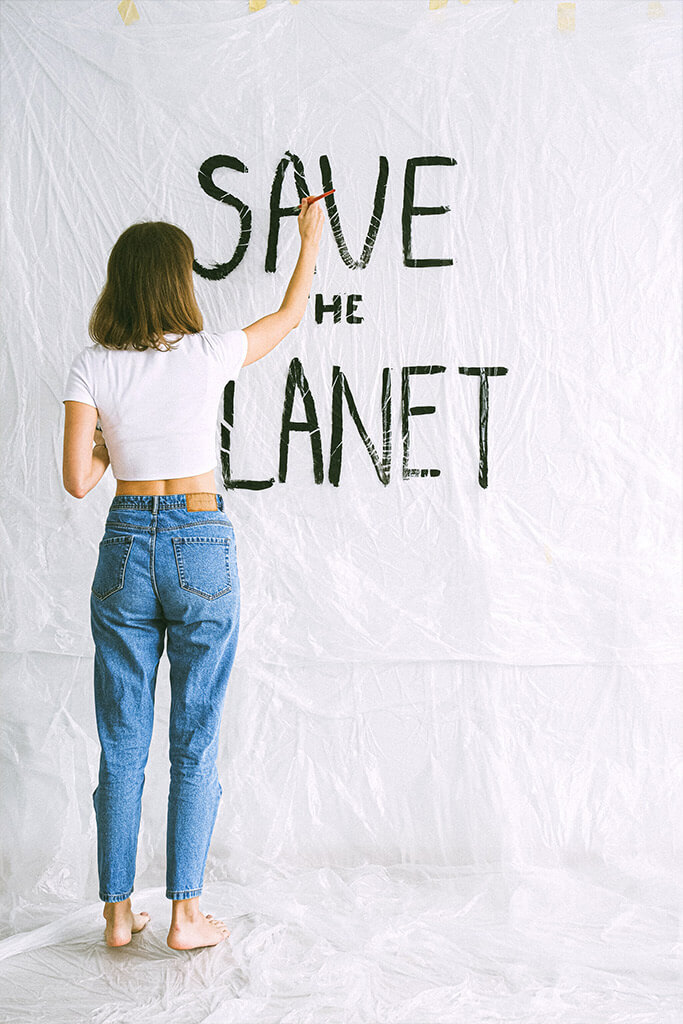The conversation about whether it is possible or not to restore our planet is much more complex than the number of resources available to you. If we look closely at the story of our Earth, we will notice that it will survive without us. Instead, why don’t we ask ourselves, can we restore the planet, so we can continue living in it?
Whenever we talk about building a new future, it’s easy to get lost in the expectations and dreams we all have. When thinking about the Earth in 30 years, some might assume the very worst, while others a better scenario. But in a climate crisis such as the one we have been facing for the last decades now, how can we even try to predict something? Truth is, there is one thing tying us to our planet: water. And it is one thing that can go on without us.
Knowing that, how do we move forward? In this case, we first need to look back to our past, accept the pain and violence we cause, and from there, we can start healing. To rewrite our future, we must recognize the harm inflicted by colonization upon Earth. Ever since this pandemic started, more than 4 million people left this world. This month, Brazil hit the mark of 500.000 lost, and it not even over yet. We lost healthcare workers, grandfathers, fathers, and sons.
Fighting this virus broke us. It cracked us open, eyes hopeless, wondering how can we survive this. To say that we live in dangerous times is a euphemism. And not just because of this pandemic. Humanity has been facing many wars with itself. As I write this, there are genocides, famines, and suffering across every country. So how can we even think about the climate emergency we are in if we are too busy hurting each other?
I’ve recently read Finding the Mother Tree: Discovering the Wisdom of the Forest by Dr. Suzanne Simard. Her groundbreaking research uncovered the world of mycorrhiza, the roots of trees are connected by this underground fungal network. Through this, nutrients, hormones, and even messages are passed between different trees. She also found out that the older trees are the most connected ones. Therefore, the name Mother Trees.
Also Read: The meat of the matter: Consequences of expanding the meat industry

Dr. Suzanne’s work is quite controversial because it doesn’t follow Darwin’s theory that the Earth is nothing but resources for colonial, patriarchal, and capitalist exploitation. For her, our planet is much more collaborative, generous, and loving. Simard’s study shows that when a Mother Tree dies, it liberates its carbon away to other trees so they can go stronger. Inside of these underground systems, energy is preserved, and nothing is lost.
When they are questions about her work, Suzanne is quick to give credits where credits are due. The influence of Indigenous teaching can be found in the way she approaches her job. As she said once, it is science, closely observed science, way more natural, we are not even close. Simard has also found how crucial it is that we are connected, and how a sense of relatedness, like those trees in the forest, can help us fight against the climate crisis. Like the Indigenous community has known this for decades now, our relationship with other living things is essential to our survival.
In a world that profits from everything. In a world where everything under the sun is exploited for capitalists reasons. Instead of empathy, we have racism, sexism, classism, and colonialism obstructing our way through evolution. In a world where the magnificent Mother Trees that Suzanne studied with deep care are facing extinction, the only path through a healing world is to part ways with colonialism, is to understand that we are much stronger if we are as tights as the roots of those trees.
Do not get me wrong. Traditional science is still fundamental to our lives indeed. Nevertheless, we question if the ways we look at the world are effective. Colonialism interrupts our scientific and human intellect progress. It only generates separation, wars, and deaths. And our science should do its very best to step away from this legacy we, as humanity, will have to carry throughout our history.
How to restore our Earth?
Restoring our planet is not an easy task. And it is not a task with one simple solution. It requires from us all our attention. It requires continuous work. It is tiring. And overwhelming. But, if we want to, at least, have a chance, we need to start by changing old beliefs, fighting dated systems, and understanding that politics, history, and science are all intertwined.
Decolonization is an important step in the direction of restocking our planet, from pandemics to the climate emergency. Like Simard’s work has proved, those who come from a colonial society can transform themselves and thereby decolonizing the system from the inside. Our journey to healing the earth will take a lot of effort, but we can start now.
First, we must take a look at ourselves and our surroundings. How engaged are you in your local politics? What are your efforts to help or assist the ones in need? Are you taking care of others the way you want to take care of the planet you call home?
For many years, we were taught to pick a side, choose a fight. They said it’s you or them. We compete against each other in politics, in football, in which country has the best cuisine. But in the future, we will have to answer if future generations deserve to live beyond our lifetimes with the actions we make today.
The earth will go on without us, but don’t you wish the next generations are able to enjoy the bright sunsets as we do? So, are you ready to save this planet?
We are, and we hope you join us on this journey. Let’s start with some real chats, shall we?
As Wendell Berry once said, the Earth is what we all have in common.


